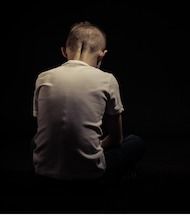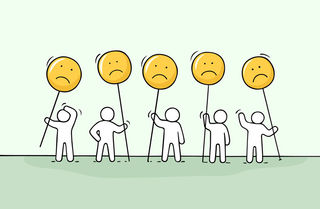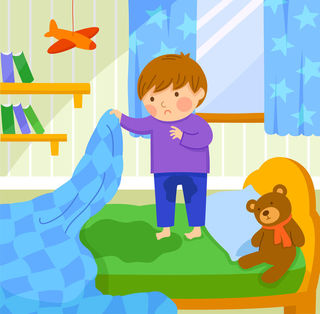Grief
When Children Grieve
What's a parent or caregiver to do when death strikes?
Posted March 20, 2019

Grieving the death of a loved one is filled with complexities that are both personal and intimate. This is true for adults as well as for children. If your child is grieving there's a good chance you are too. That's part of why it can be hard to attend to your child in their grief.
The lyrics in the song, "Guernica", tap into the feelings often felt by grieving parents or caregivers:
Your brain on grief is different than your child's brain on grief and though you want to be present, you may find it hard to give what is needed. That's ok. Asking for help or support from another is a good teaching element for the child who is mourning.
What you can do is find a way into their language around grief.
The ability to gauge their reactions, while you're also in the tide of managing your own grief, can be confusing, concerning and powerful. If you can, listen with your senses and see how the child communicates: Is it verbal or non-verbal communication, is through the games they play or don't play, or have their sleep and eating behaviors shifted in ways that are not their norm.
When children face the permanence of loss, it can be difficult to help them, be present with them, while also facing the temperament of your own mourning process. I'm often asked to define some of the best ways to navigate this unknown territory for kids, as they sit in their own sense of what loss is to them. Without true guidelines to follow, it's hard to know what to do, what to say or when to say it.
To help kids through this sticky process, think about mapping out what your child needs, as you observe behavior, speech, interactions with others and with you.
Here are the 10 Do’s and Don’ts that offer an understanding how best to help children honor their process in the complexities of grief while providing specifics as to how to be a good witness through this difficult time. Remember, no one grieves or mourns in the exact same way.

5 Dos for You to Help Your Child:
1. Give Permission to Grieve
It's really hard to see a child’s pain and suffering especially when it's because of a loss. Chances are they've never experienced a loss before and are in unknown territory. The caregiver might be in unknown territory, as well. Children grieve in their own way. For some kids, withdrawing into video games is their chosen means of coping, while for others, developmental regression can occur, for example, bedwetting can occur even though they had previously conquered that phase. Allow the child to show whatever emotions they're feeling. Give them permission to do it in their way.
2. Curiosity and Care
Be curious about what the child is experiencing. Ask lots of questions, yet with care. Create questions that are unobtrusive and paced. You can use your own experience to discuss the loss. Here is a sample of what to say to the child from a curious stance: “I was thinking about the death of your pet, and it brought up a big lump in my throat. I feel sad. Do you know what you’re feeling?” Once the question has been posted, patiently wait for a response. Pictures of the dead relative can also provoke feelings and open the door for more interaction. Sometimes it's a piece of clothing or even a scent. Our senses of smell are the strongest and take us back into our memories faster than any other sense.
Surprisingly, responses to death may be delayed or could happen immediately. Triggers like an aroma, or someone who walks or talks like the lost loved one can provoke a response. Grief doesn't look or smell the same for everyone.
3. Questions and Honest Answers
When kids are mourning the loss of a parent, sibling or anyone who's been dear to them, they'll start to ask questions about death. The questions can come at the oddest times. Yes, after the immediate loss, but sometimes 6—8 months after the initial shock and the newness of the loss has begun to diminish, that's when the questions about death can occur. Here are some of the most common questions asked: “What is death? Why do people die? Where do they go when they die? Will I die, too? Can’t they come back?” Answer them as honestly as you are able. Find a way, to be honest, and yet, with an age appropriate response.
4. Role of Parent: Separate your Grief from theirs
If the entire family is suffering from the death of a loved one, often the child(ren) experience a double loss - the death of the loved one and the loss of the grieving parent(s). Though it is difficult to put the emotions of grief aside, remember that children are vulnerable, taking cues from the way in which you cope and handle the loss. If you hide and retreat, they may do the same. For kids, it can be harder to come out of the emotional shell than for adults. If you need time for emotional regulation or assessment, find shared activities that can offer each of you a "go to" when the emotions are overwhelming. I like to imagine and even create a symbolic ‘cry box” used to store emotions when they become overwhelming. When ready you can revisit the "cry box" together. Look into it, understand what's in it, talk about it, draw the emotions and sort through them. This becomes a bit of a ritual. A new beginning for sharing and holding one another during this very hard and complicated time.

5. The Gift of Grief - Think of T.H.E.M.
In every loss, there is a birth. It's very difficult to imagine that there could be something empowering about the loss. Often, children become more inventive, or better at sports or more insightful when they have lost a loved one or even a pet. When you are aware of the shifts the child has made, gently communicate what changes you've seen in them since the loss. This may occur over the weeks and months after the loss or it can take years. Children shift when they come into close proximity to death. How can you take these changes and move them into a positive sphere for your child? Think of how to help THEM by giving them:
T- Truth - Be honest
H. Honor - The time they need to heal
E. Emotion - Allow for the full range of emotions.
M. Memory - Keep the memories alive.
5 Try Not To's (Don'ts):
Things to Avoid When Your Child Meets Grief:
1. Time for Mourning
Children do not mourn the same way adults mourn. Don't devalue the child's grief. It's real and it can be scary to lose a loved one, especially if this kind of death, the death of a parent, grandparent or sibling has never been experienced. If you see them playing, don’t stop them, as they may be working out some aspect of grief in their own language or comfort zone. Don't tell them to be strong and get over it. This is not something anyone gets over. Rather, it is a dance that one learns to partner with.
2. The Truth, Please!
When you say “Daddy is resting or just asleep” or “You'll see your dog in your dreams” you are implanting a false belief that can cause undue stress and fear for your child. No matter how old your child is, using metaphors for death that liken it to sleep can manifest in sleeplessness, anxiety before bedtime or agitation about how death happens. Lack of sleep may lead to anxiety and depression for children. Try saying “ Daddy died. He is in our memories and we can keep him alive in our hearts” If you find yourself saying, "Don't worry I will never die." as a means to give comfort, once again they are hearing a lie about life and death. "I am here with you right now" is the truth. Kids need the truth, yet the truth must also be age appropriate. Don't give them false pictures of death or life.
3. Children Need to be Children.

It's often a knee jerk reaction to "adultify" the children in the house. Role reassigning will not bring back your loved one. If you find yourself saying "now that Dad or Mom has died you will sit in his or her seat, or you will cook or you will be the new head of the family." Do not put them in Dad’s chair or expect them to do the shopping that Mom used to do. Give them responsibilities in the home that are age appropriate, although not given as a response to the loss.
4. Hide and Seek: The Game of Grief
There are 11 phases of mourning. They come to you rather than you seeking them out. When in the state of grief, children can have outrageous responses to simple situations and stimuli. They may act out through angry outbursts, they may regress in their developmental stages or they may seem difficult to reach. Depending on whether they are an extrovert or an introvert, their response to loss will also vary. Put punishments aside for now.

If your child starts wetting their bed after experiencing a death, allow for backward, regressive movement. They might wait for a reaction from you. Hold onto yourself. Share with them that all of you are having a hard time with the loss. If you normalize the reactions, the child will re-‐enter their appropriate developmental phase. And do so in their time.
5. Even if you don't believe- Go for Group and Support
Children often cope with death when they are exposed to other kids who have had a similar loss. No matter what your beliefs are about therapy, this is not about you but what's good for your child. Local houses of worship, YMCA’s, and even family clinics often offer grief support groups for kids of all ages. This is not about you, it's about helping your child cope with their loss.
C.S Lewis wrote the most apt statement regarding parents coping with children who are grieving: “...the wish to protect the child from the pain of an irreversible loss contains the adults reluctance to confront a shattered illusion.”
References
Brand New (2003) Deja Entendu -Song "Guernica" Brand New -"Guernica"
Lewis, C.S., A Grief Observed.(1961) HarperOne.Harper Collins. New York CIty, NY




